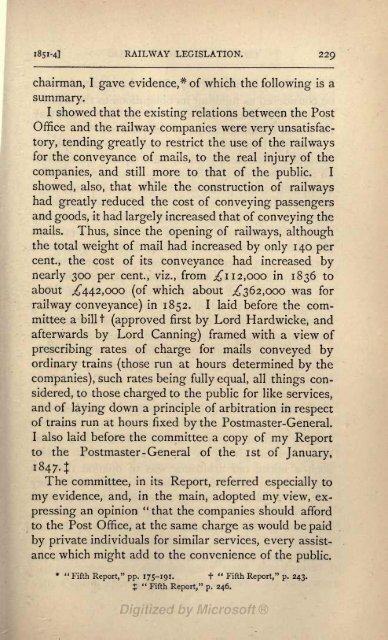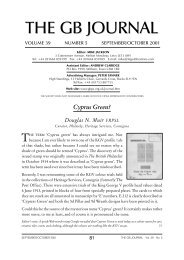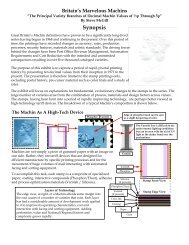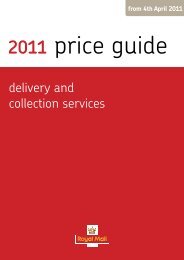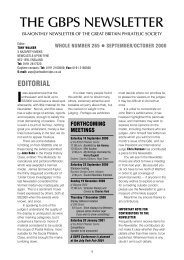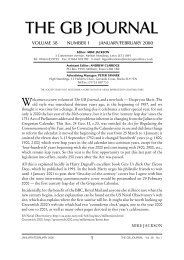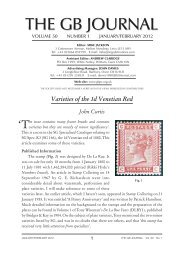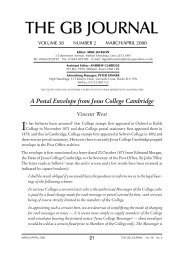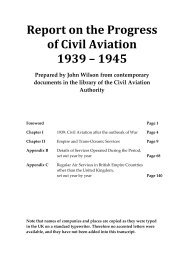- Page 5 and 6:
THE LIFE OF SIR ROWLAND HILL K.C.B.
- Page 7 and 8:
CONTENTS OF SECOND VOLUME. BOOK II.
- Page 9 and 10:
CONTENTS. Vll CHAPTER XIX. PARTIAL
- Page 11 and 12:
CONTENTS. ix CHAPTER XXVI. MISCELLA
- Page 13:
BOOK II. HISTORY OF PENNY POSTAGE.
- Page 16 and 17:
2 LIFE OF SIR ROWLAND HILL. [1843 O
- Page 18 and 19:
4 LIFE OF SIR ROWLAND KILL. [1843 m
- Page 20 and 21:
6 LIFE OF SIR ROWLAND HILL. [1843 A
- Page 22 and 23:
8 LIFE OF SIR ROWLAND HILL. [1843 A
- Page 24 and 25:
10 LIFE OF SIR ROWLAND HILL. [1843
- Page 26 and 27:
12 LIFE OF SIR ROWLAND HILL. [1843
- Page 28 and 29:
14 LIFE OF SIR ROWLAND HILL. [1843
- Page 30 and 31:
1 6 LIFE OF SIR ROWLAND HILL. [1843
- Page 32 and 33:
1 8 LIFE OF SIR ROWLAND HILL. [1843
- Page 34 and 35:
20 LIFE OF SIR ROWLAND HILL. [1843-
- Page 36 and 37:
22 LIFE OF SIR ROWLAND HILL. [1843-
- Page 38 and 39:
24 LIFE OF SIR ROWLAND HILL. [1843-
- Page 40 and 41:
26 LIFE OF SIR ROWLAND HILL. [1843-
- Page 42 and 43:
28 LIFE OF SIR ROWLAND HILL. [1844-
- Page 44 and 45:
30 LIFE OF SIR ROWLAND HILL. [1844-
- Page 46 and 47:
32 LIFE OF SIR ROWLAND HILL. [1846
- Page 48 and 49:
34 LIFE OF SIR ROWLAND HILL. [1846
- Page 50 and 51:
36 LIFE OF SIR ROWLAND HILL. [1846
- Page 52 and 53:
38 LIFE OF SIR ROWLAND HILL. [1846
- Page 54 and 55:
40 LIFE OF SIR ROWLAND HILL. [1846
- Page 56 and 57:
42 LIFE OF SIR ROWLAND HILL. [1846
- Page 58 and 59:
44 LIFE OF SIR ROWLAND HILL. [1846
- Page 60 and 61:
46 LIFE OF SIR ROWLAND HILL. [1846
- Page 62 and 63:
48 LIFE OF SIR ROWLAND HILL. [1846
- Page 64 and 65:
5O LIFE OF SIR ROWLAND HILL. [1846
- Page 66 and 67:
52 LIFE OF SIR ROWLAND HILL. [1847
- Page 68 and 69:
54 LIFE OF SIR ROWLAND HILL. [1847
- Page 70 and 71:
$6 LIFE OF SIR ROWLAND HILL. [1847
- Page 72 and 73:
58 LIFE OF SIR ROWLAND HILL. [1847
- Page 74 and 75:
60 LIFE OF SIR ROWLAND HILL. [1847
- Page 76 and 77:
62 LIFE OF SIR ROWLAND HILL. [1847
- Page 78 and 79:
64 LIFE OF SIR ROWLAND HILL. [1847
- Page 80 and 81:
66 LIFE OF SIR ROWLAND HILL. [1847
- Page 82 and 83:
68 LIFE OF SIR ROWLAND HILL. [1847
- Page 84 and 85:
7
- Page 86 and 87:
72 LIFE OF SIR ROWLAND HILL. [1847-
- Page 88 and 89:
74 LIFE OF SIR ROWLAND HILL. [1847-
- Page 90 and 91:
?6 LIFE OF SIR ROWLAND HILL. [1847-
- Page 92 and 93:
78 LIFE OF SIR ROWLAND HILL. [1847-
- Page 94 and 95:
8O LIFE OF SIR ROWLAND HILL. [1847-
- Page 96 and 97:
82 LIFE OF SIR ROWLAND HILL. [1848
- Page 98 and 99:
84 LIFE OF SIR ROWLAND HILL. [1848
- Page 100 and 101:
86 LIFE OF SIR ROWLAND HILL. [1848
- Page 102 and 103:
88 LIFE OF SIR ROWLAND HILL. [1848
- Page 104 and 105:
90 LIFE OF SIR ROWLAND HILL. [1848
- Page 106 and 107:
92 LIFE OF SIR ROWLAND HILL. [1848
- Page 108 and 109:
94 LIFE OF SIR ROWLAND HILL. [1848
- Page 110 and 111:
96 LIFE OF SIR ROWLAND HILL. [1848
- Page 112 and 113:
98 LIFE OF SIR ROWLAND HILL. [1848
- Page 114 and 115:
100 LIFE OF SIR ROWLAND HILL. [1848
- Page 116 and 117:
IO2 LIFE OF SIR ROWLAND HILL. [1849
- Page 118 and 119:
104 LIFE OF SIR ROWLAND HILL. [1849
- Page 120 and 121:
106 LIFE OF SIR ROWLAND HILL. [1849
- Page 122 and 123:
108 LIFE OF SIR ROWLAND HILL. [1849
- Page 124 and 125:
IIO LIFE OF SIR ROWLAND HILL. [1849
- Page 126 and 127:
112 LIFE OF SIR ROWLAND HILL. [1849
- Page 128 and 129:
114 LIFE OF SIR ROWLAND HILL. [1849
- Page 130 and 131:
Il6 LIFE OF SIR ROWLAND HILL. [1849
- Page 132 and 133:
Il8 LIFE OF SIR ROWLAND HILL. [1849
- Page 134 and 135:
120 LIFE OF SIR ROWLAND HILL. [1849
- Page 136 and 137:
122 LIFE OF SIR ROWLAND HILL. [1849
- Page 138 and 139:
124 LIFE OF SIR ROWLAND HILL. [1849
- Page 140 and 141:
126 LIFE OF SIR ROWLAND HILL. [1849
- Page 142 and 143:
128 LIFE OF SIR ROWLAND HILL. [1849
- Page 144 and 145:
130 LIFE OF SIR ROWLAND HILL. [1849
- Page 146 and 147:
132 LIFE OF SIR ROWLAND HILL. [1849
- Page 148 and 149:
134 LIFE OF SIR ROWLAND HILL. [1849
- Page 150 and 151:
136 LIFE OF SIR ROWLAND HILL. [1849
- Page 152 and 153:
138 LIFE OF SIR ROWLAND HILL. [1849
- Page 154 and 155:
140 LIFE OF SIR ROWLAND HILL. [1849
- Page 156 and 157:
142 LIFE OF SIR ROWLAND HILL. [1849
- Page 158 and 159:
144 LIFE OF SIR ROWLAND HILL. [1850
- Page 160 and 161:
146 LIFE OF SIR ROWLAND HILL. [1850
- Page 162 and 163:
148 LIFE OF SIR ROWLAND HILL. [1850
- Page 164 and 165:
150 LIFE OF SIR ROWLAND HILL. [1850
- Page 166 and 167:
152 LIFE OF SIR ROWLAND HILL. [1850
- Page 168 and 169:
154 LIFE OF SIR ROWLAND HILL. [1850
- Page 170 and 171:
156 LIFE OF SIR ROWLAND HILL. [1850
- Page 172 and 173:
158 LIFE OF SIR ROWLAND HILL. [1850
- Page 174 and 175:
160 LIFE OF SIR ROWLAND HILL. [1850
- Page 176 and 177:
1 62 LTFE OF SIR ROWLAND HILL. [185
- Page 178 and 179:
1 64 LIFE OF SIR ROWLAND HILL. [185
- Page 180 and 181:
166 LIFE OF SIR ROWLAND HILL. [1850
- Page 182 and 183:
1 68 LIFE OF SIR ROWLAND HILL. [185
- Page 184 and 185:
LIFE OF SIR ROWLAND HILL. [1851 pro
- Page 186 and 187:
1/2 LIFE OF SIR ROWLAND HILL. [1851
- Page 188 and 189:
174 LIFE OF SIR ROWLAND HILL. [1851
- Page 190 and 191:
LIFE OF SIR ROWLAND HILL. It will e
- Page 192 and 193: 178 LIFE OF SIR ROWLAND HILL. [1849
- Page 194 and 195: ISO LIFE OF SIR ROWLAND HILL. [1849
- Page 196 and 197: 1 82 LIFE OF SIR ROWLAND HILL. [184
- Page 198 and 199: 1 84 LIFE OF SIR ROWLAND HILL. [184
- Page 200 and 201: 1 86 LIFE OF SIR ROWLAND HILL. [184
- Page 202 and 203: 1 88 LIFE OF SIR ROWLAND HILL. [184
- Page 204 and 205: LIFE OF SIR ROWLAND HILL. [1849-51
- Page 206 and 207: 192 LIFE OF SIR ROWLAND HILL. [1849
- Page 208 and 209: 194 LIFE OF SIR ROWLAND HILL. [1851
- Page 210 and 211: 196 LIFE OF SIR ROWLAND HILL. [1851
- Page 212 and 213: 198 LIFE OF SIR ROWLAND HILL. [1852
- Page 214 and 215: 20O LIFE OF SIR ROWLAND HILL. [1852
- Page 216 and 217: 202 LIFE OF SIR ROWLAND HILL. [1854
- Page 218 and 219: 2O4 LIFE OF SIR ROWLAND HILL. [1852
- Page 220 and 221: 206 LIFE OF SIR ROWLAND HILL. [1852
- Page 222 and 223: 208 LIFE OF SIR ROWLAND HILL. [1852
- Page 224 and 225: 2IO LIFE OF SIR ROWLAND HILL. [1852
- Page 226 and 227: 212 LIFE OF SIR ROWLAND HILL. [1852
- Page 228 and 229: 214 LIFE OF SIR ROWLAND HILL. [1853
- Page 230 and 231: 2l6 LIFE OF SIR ROWLAND HILL. [1853
- Page 232 and 233: 2l8 LIFE OF SIR ROWLAND HILL. [1853
- Page 234 and 235: 220 LIFE OF SIR ROWLAND HILL. [1853
- Page 236 and 237: 222 LIFE OF SIR ROWLAND HILL. [1854
- Page 238 and 239: 224 LIFE OF SIR ROWLAND HILL. [1854
- Page 240 and 241: 226 LIFE OF SIR ROWLAND HILL. [1854
- Page 244 and 245: 230 LIFE OF SIR ROWLAND HILL. [1851
- Page 246 and 247: 232 LIFE OF SIR ROWLAND HILL. [1851
- Page 248 and 249: 234 LIFE OF SIR ROWLAND HILL. [1851
- Page 250 and 251: 236 LIFE OF SIR ROWLAND HILL. [1851
- Page 252 and 253: 238 LIFE OF SIR ROWLAND HILL. [1851
- Page 254 and 255: 240 LIFE OF SIR ROWLAND HILL. [1851
- Page 256 and 257: 242 LIFE OF SIR ROWLAND HILL. [1851
- Page 258 and 259: 244 LIFE OF SIR ROWLAND HILL. [1851
- Page 260 and 261: 246 LIFE OF SIR ROWLAND HILL. [1851
- Page 262 and 263: 248 LIFE OF SIR ROWLAND HILL. [1851
- Page 264 and 265: 250 LIFE OF SIR ROWLAND HILL. [1851
- Page 266 and 267: LIFE OF SIR ROWLAND HILL. [1851-4 c
- Page 268 and 269: 254 LIFE OF SIR ROWLAND HILL. [1851
- Page 270 and 271: 256 LIFE OF SIR ROWLAND HILL. [1851
- Page 272 and 273: 258 LIFE OF SIR ROWLAND HILL. [1851
- Page 274 and 275: 26O LIFE OF SIR ROWLAND HILL. [1851
- Page 276 and 277: 262 LIFE OF SIR ROWLAND HILL. [1854
- Page 278 and 279: 264 LIFE OF SIR ROWLAND HILL. [1854
- Page 280 and 281: 266 LIFE OF SIR ROWLAND HILL. [1854
- Page 282 and 283: 268 LIFE OF SIR ROWLAND HILL. [1855
- Page 284 and 285: 2/0 LIFE OF SIR ROWLAND HILL. [1855
- Page 286 and 287: 2/2 LIFE OF SIR ROWLAND HILL. [1855
- Page 288 and 289: 274 LIFE OF SIR ROWLAND HILL. [1855
- Page 290 and 291: 276 LIFE OF SIR ROWLAND HILL. [1855
- Page 292 and 293:
2/8 LIFE OF SIR ROWLAND HILL. [1855
- Page 294 and 295:
280 LIFE OF SIR ROWLAND HILL. [1855
- Page 296 and 297:
282 LIFE OF SIR ROWLAND HILL. [1855
- Page 298 and 299:
284 LIFE OF SIR ROWLAND HILL. [1855
- Page 300 and 301:
286 LIFE OF SIR ROWLAND HILL. [i855
- Page 302 and 303:
288 LIFE OF SIR ROWLAND HILL. '[185
- Page 304 and 305:
2QO LIFE OF SIR ROWLAND HILL. [1855
- Page 306 and 307:
292 LIFE OF SIR ROWLAND HILL. [1855
- Page 308 and 309:
294 LIFE OF $IR ROWLAND HILL. [1855
- Page 310 and 311:
296 LIFE OF SIR ROWLAND HILL. [1855
- Page 312 and 313:
298 LIFE OF SIR ROWLAND HILL. [1855
- Page 314 and 315:
300 LIFE OF SIR ROWLAND HILL. [1855
- Page 316 and 317:
302 LIFE OF SIR ROWLAND HILL. [1855
- Page 318 and 319:
304 LIFE OF SIR ROWLAND HILL. [1855
- Page 320 and 321:
306 LIFE OF SIR ROWLAND HILL. [1855
- Page 322 and 323:
308 LIFE OF SIR ROWLAND HILL. [1855
- Page 324 and 325:
310 LIFE OF SIR ROWLAND HILL. [1854
- Page 326 and 327:
312 LIFE OF SIR ROWLAND HILL. [1854
- Page 328 and 329:
314 LIFE OF SIR ROWLAND HILL. [1855
- Page 330 and 331:
316 LIFE OF SIR ROWLAND HILL. [1855
- Page 332 and 333:
3l8 LIFE OF SIR ROWLAND HILL. [1855
- Page 334 and 335:
320 LIFE OF SIR ROWLAND HILL. [1855
- Page 336 and 337:
322 LIFE OF SIR ROWLAND HILL. [1855
- Page 338 and 339:
324 LIFE OF SIR ROWLAND HILL. [1855
- Page 340 and 341:
326 LIFE OF SIR ROWLAND HILL. [1855
- Page 342 and 343:
328 LIFE OF SIR ROWLAND HILL. [1855
- Page 344 and 345:
330 LIFE OF SIR ROWLAND HILL. [1855
- Page 346 and 347:
332 LIFE OF SIR ROWLAND HILL. [1855
- Page 348 and 349:
334 LIFE OF SIR ROWLAND HILL. [1855
- Page 350 and 351:
LIFE OF SIR ROWLAND HILL. [1855-9 c
- Page 352 and 353:
LIFE OF SIR ROWLAND HILL. [1855-9 w
- Page 354 and 355:
34 LIFE OF SIR ROWLAND HILL. [1855-
- Page 356 and 357:
342 LIFE OF SIR ROWLAND HILL. [1855
- Page 358 and 359:
344 LIFE OF SIR ROWLAND HILL. [1855
- Page 360 and 361:
34 6 LIFE OF SIR ROWLAND HILL. [185
- Page 362 and 363:
348 LIFE OF SIR ROWLAND HILL. [1855
- Page 364 and 365:
350 LIFE OF SIR ROWLAND HILL. [1855
- Page 366 and 367:
352 LIFE OF SIR ROWLAND HILL. [1855
- Page 368 and 369:
354 LIFE OF SIR ROWLAND HILL. [1855
- Page 370 and 371:
LIFE OF SIR ROWLAND HILL. [1855-60
- Page 372 and 373:
358 LIFE OF SIR ROWLAND HILL. [1855
- Page 374 and 375:
360 LIFE OF SIR ROWLAND HILL. [1855
- Page 376 and 377:
362 LIFE OF SIR ROWLAND HILL. [1855
- Page 378 and 379:
364 LIFE OF SIR ROWLAND HILL. [1860
- Page 380 and 381:
366 LIFE OF SIR ROWLAND HILL. [1860
- Page 382 and 383:
368 LIFE OF SIR ROWLAND HILL. [1860
- Page 384 and 385:
37O LIFE OF SIR ROWLAND HILL. [1860
- Page 386 and 387:
372 LIFE OF SIR ROWLAND HILL. [1860
- Page 388 and 389:
3/4 LIFE OF SIR ROWLAND HILL. [1867
- Page 390 and 391:
3/6 LIFE OF SIR ROWLAND HILL. [1864
- Page 392 and 393:
378 LIFE OF SIR ROWLAND HILL. [1864
- Page 394 and 395:
$80 LIFE OF SIR ROWLAND HILL. [1864
- Page 396 and 397:
LIFE OF SIR ROWLAND HILL. [1864 due
- Page 398 and 399:
384 LIFE OF SIR ROWLAND HILL. [1864
- Page 400 and 401:
386 LIFE OF SIR ROWLAND HILL. [1864
- Page 402 and 403:
388 LIFE OF SIR ROWLAND HILL. [1864
- Page 404 and 405:
390 LIFE OF SIR ROWLAND HILL. [1864
- Page 406 and 407:
3Q2 LIFE OF SIR ROWLAND HILL. [1864
- Page 408 and 409:
394 LIFE OF SIR ROWLAND HILL. [1864
- Page 410 and 411:
LIFE OF SIR ROWLAND HILL. [1864 ben
- Page 412 and 413:
398 LIFE OF SIR ROWLAND HILL. [1864
- Page 414 and 415:
40O LIFE OF SIR ROWLAND HILL. [1864
- Page 416 and 417:
402 LIFE OF SIR ROWLAND HILL. be re
- Page 418 and 419:
404 LIFE OF SIR ROWLAND HILL. am co
- Page 420 and 421:
406 LIFE OF SIR ROWLAND HILL. remem
- Page 423:
BOOK III. CONCLUSION. " He that die
- Page 426 and 427:
412 LIFE OF SIR ROWLAND HILL. could
- Page 428 and 429:
414 LIFE OF SIR ROWLAND HILL. publi
- Page 430 and 431:
41 6 LIFE OF SIR ROWLAND HILL. Comm
- Page 432 and 433:
41 8 LIFE OF SIR ROWLAND HILL. prim
- Page 434 and 435:
42O LIFE OF SIR ROWLAND HILL. has d
- Page 436 and 437:
422 University LIFE OF SIR ROWLAND
- Page 438 and 439:
424 LIFE OF SIR ROWLAND HILL. make
- Page 440 and 441:
426 LIFE OF SIR ROWLAND HILL. close
- Page 442 and 443:
428 LIFE OF SIR ROWLAND HILL. Fresh
- Page 444 and 445:
430 LIFE OF SIR ROWLAND HILL. holdi
- Page 446 and 447:
432 LIFE OF SIR ROWLAND HILL. till
- Page 448 and 449:
434 I'IFE OF SIR ROWLAND HILL. Hill
- Page 451 and 452:
APPENDIX; A [See p. 101.] Letter to
- Page 453 and 454:
APPENDIX A. 439 Some of the improve
- Page 455 and 456:
APPENDIX A. 441 opinions of parties
- Page 457 and 458:
APPENDIX B [ See p. 105.] Further l
- Page 459 and 460:
APPENDIX C [Seep. 105.] Lord Clanri
- Page 461 and 462:
APPENDIX D. 447 department ; second
- Page 463 and 464:
APPENDIX D. 449 and I should propos
- Page 465 and 466:
APPENDIX D. 451 serious complaint f
- Page 467 and 468:
APPENDIX E [See p. 126.] Letter to
- Page 469 and 470:
APPENDIX F. [Seep. 134.] Anonymous
- Page 471 and 472:
APPENDIX G. [See p. 164.] Letter to
- Page 473 and 474:
APPENDIX G. 459 This, however, cons
- Page 475 and 476:
APPENDIX H. 461 I was given to unde
- Page 477 and 478:
APPENDIX H. 463 arrears, and to pre
- Page 479 and 480:
APPENDIX H. 465 this is the result
- Page 481 and 482:
The amount of Government postage is
- Page 483 and 484:
APPENDIX I. 469 service, which expe
- Page 485 and 486:
APPENDIX I. 471 points affecting re
- Page 487 and 488:
APPENDIX I. 473 prepared with a vie
- Page 489 and 490:
APPENDIX J. 475 mail service. The r
- Page 491 and 492:
APPENDIX J. 477 the Postmaster-Gene
- Page 493 and 494:
APPENDIX K. 479 public, whether at
- Page 495 and 496:
APPENDIX K. 481 15. The Panama rout
- Page 497 and 498:
APPENDIX L. 483 several days, as co
- Page 499 and 500:
APPENDIX M. 485 And here it may be
- Page 501 and 502:
APPENDIX M. 487 4th. As the power o
- Page 503 and 504:
APPENDIX M. 489 On the plan set for
- Page 505 and 506:
APPENDIX M. 491 Post Office propose
- Page 507 and 508:
APPENDIX N. 493 MEMORANDUM. A low a
- Page 509:
INDEX.
- Page 512 and 513:
498 vol. ii. 388, 397, 41 1 ; budge
- Page 514 and 515:
500 Commission, Lord Canning's (Pac
- Page 516 and 517:
5O2 INDEX. Gibson, Mr. Milner, vol.
- Page 518 and 519:
504 47; attends his father's school
- Page 520 and 521:
506 mysterious allusion in Mr. Cobd
- Page 522 and 523:
508 INDEX. INCOME-TAX Commissioners
- Page 524 and 525:
Map-making, vol. i. 79, 86 Marcet,
- Page 526 and 527:
512 Piron, M., vol. i. 341, 377, vo
- Page 528 and 529:
Schuster, Mr., vol. ii. 285 Scotlan
- Page 530:
5 i6 INDEX. Wallace, Mr. Robert, vo


